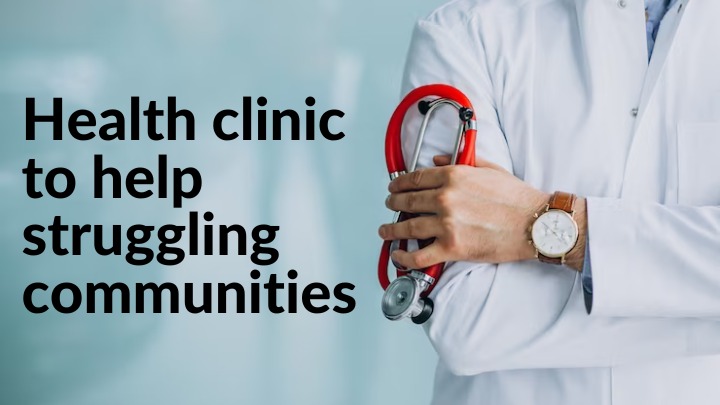
Healthcare is a fundamental right for every individual, but unfortunately, not everyone has equal access to it. Disadvantaged communities often lack adequate healthcare facilities and struggle with health-related issues. To address this problem, setting up health clinic to help struggling communities can prove to be effective. Access to healthcare is vital to ensure that families in disadvantaged communities can lead healthy lives. However, these communities often face significant obstacles, with limited resources for health care initiatives.
These clinics provide easy access to medical facilities and healthcare professionals, which can make a significant difference in the lives of families living in these communities. By having such clinics in their vicinity, families can receive timely medical attention, which can prevent minor health issues from turning into serious ones. Moreover, these clinics can also provide guidance and support in terms of nutrition and disease prevention, which can help families maintain good health in the long run.
Nevertheless, there are ways to address this concern. Here are tips for opening up health clinic which can give proper help and support to disadvantaged communities and families. It will help who live in such locations.
-
- Collaboration with other organizations can increase resources and reduce costs.
- Assessing the healthcare needs of the community before setting up a clinic is crucial to determine the appropriate services to offer.
- Acquiring necessary equipment like clinical chemistry analyzers, diagnostic imaging equipment, laboratory equipment, and medical supplies is essential for any medical clinic.
- Educating and engaging the community about available healthcare resources and developing a robust financial plan are crucial.
- Developing a marketing and outreach plan is necessary for promoting the clinic’s services and establishing a network of support.
Collaborate with other organizations
Collaboration is key when it comes to creating health clinics in disadvantaged communities. Collaborating with other organizations can help increase resources, reduce costs, and ensure a more comprehensive approach to health care.
Reach out to local nonprofits, government organizations, and hospitals for partnerships. It’s essential to work together to determine the needs of the community and create a plan that can address these needs.
Assess the healthcare needs of the community
Before opening up a health clinic, it’s crucial to assess the community’s healthcare needs. Determine what type of services are required, such as preventive care, chronic disease management, or mental health care. Talking to community leaders can help provide insight into the community’s healthcare challenges, so you can select the right services to offer.
Acquire the necessary equipment
Based on your assessment of the community’s healthcare needs, you’ll need to acquire the necessary equipment for your clinic. While this could vary depending on the services you plan to provide, there are some basic items that are essential for any health clinic, such as the following:
Clinical chemistry analyzer
A clinical chemistry analyzer is used to analyze and measure components like glucose, lipids, enzymes, electrolytes, and other substances in a sample of body fluid. A clinical chemistry analyzer should be used for all medical clinics, as it can help detect any abnormalities in the body.

Diagnostic imaging equipment
Diagnostic imaging equipment is essential for any health clinic. It allows doctors to get a better understanding of the patient’s condition or illness by providing detailed images of their internal organs and body systems. Diagnostic imaging equipment includes X-rays, computed tomography (CT) scans, and magnetic resonance imaging (MRI).
Laboratory equipment
Laboratory equipment is needed to perform tests and diagnose any conditions that may be present. A laboratory should include items like microscopes, centrifuges, test tubes, and other tools used for analyzing body samples.
Medical supplies
Medical supplies are essential for any medical clinic. These include items like bandages, gauze, gloves, syringes, and other medical equipment that can help diagnose and treat illnesses.
By acquiring the equipment necessary to provide healthcare services, you can now start educating the community about available resources and healthcare options. In addition to it, you should also invest in medical billing software. It takes care of error free billing, systematic approach, insurance eligibility benefits verification, streamlined revenue cycle and its related things.
Hire competent healthcare providers
Hiring competent healthcare providers is crucial for the success of a health clinic. Find professionals who have experience working with disadvantaged communities and have a passion for improving the health of families in need. Medical professionals must understand the issues faced by underprivileged families, show empathy and care, and engage the community to provide a thoughtful healthcare experience.
Establish a robust financial plan
Setting up and running a health clinic can be costly, and funding can be hard to come by. A robust financial plan is crucial to ensure that the clinic can provide quality care to the community. Look for grants, partnerships, and fundraising opportunities to fund the clinic’s operations. Develop a fundraising plan that can bring in sustainable and long-term funding to ensure that the medical centre can provide vital healthcare services.

Develop a marketing and outreach plan
A successful medical centre requires robust marketing and outreach efforts. Create an outreach plan to educate the community about the its services and how to access them. Develop a marketing plan that includes social media, advertising, and community events. Reach out to community leaders to help spread the news and to create a strong network of support.
Establishing medical clinics in disadvantaged communities can be a challenging task. However, following the tips outlined above, you can ensure families can access quality healthcare services.
From assessing the community’s needs and acquiring the necessary equipment to hiring competent medical professionals and developing a financial plan – these steps are essential for running an effective health clinic. By collaborating with other organizations, educating the community about available resources, and creating strong marketing campaigns, you’ll be well on your way to providing vital care services to those who need it most.
Conclusion
By setting up health clinics in disadvantaged and struggling communities, we not only ensure that families have access to quality healthcare but also empower them to take control of their health. Such clinics can be established in collaboration with local authorities and community members, who can provide valuable insights into the specific healthcare needs of the area.
With the right resources and support, we can make a positive impact on the health and wellbeing of families in disadvantaged communities.
